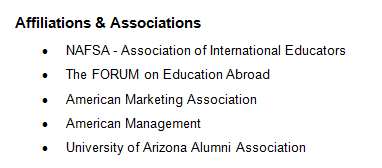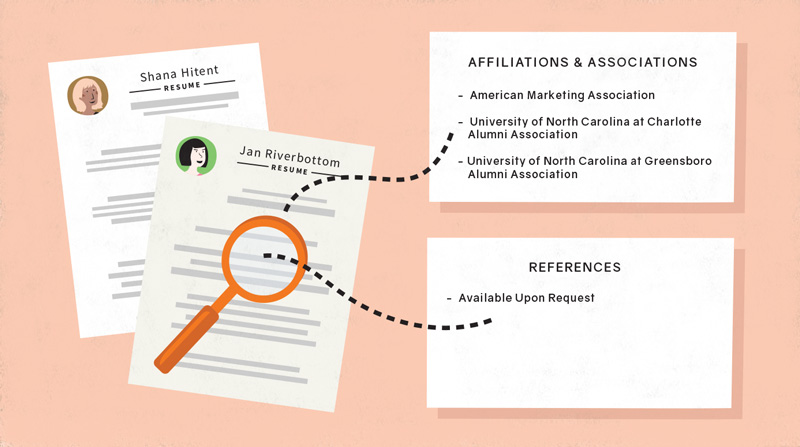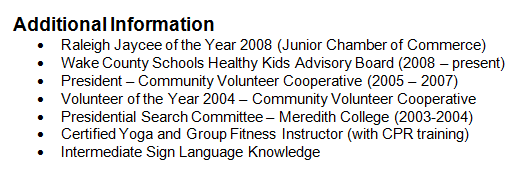Lesson 8: Additional Information and References
/en/resumewriting/education-information/content/
Additional information and references
Resumes focus on your previous job experiences. However, there may be times when including a skill or accomplishment that was gained outside of your work history could greatly influence a hiring manager. For example, did you win City Volunteer of the Year for your work with a homeless shelter? Or perhaps you have a useful language skill, such as being fluent in Spanish. There is a place for these types of things—as well as a spot to include references if you choose—on your resume.
In this lesson, you will determine what type of additional information is appropriate to include on your resume.
Watch the video below to learn what to include in the skills section of your resume.
Additional skills and information
Sometimes you may want to include additional information about yourself that comes from outside of your education and work history. For example, you may want to include your fluency in another language, a special community project you coordinated or managed, or maybe even your technology skills outside of what you included in your employment history.
So where do you include additional skills and information on your resume? Here are some options.
- Sometimes your work history will indicate your computer competency, but if it is not obvious you may want to list your computer skills separately. Many jobs require basic computer skills and knowledge of Microsoft Office, so it may be important to let a hiring manager know you have these skills. Some positions require knowledge of industry-specific computer programs. For example, a graphic artist may be expected to know Photoshop and Illustrator, so they should list these skills on their resume.

- Some positions require specific technical skills that are common in a particular industry. For example, a contractor would be expected to be able to read blueprints, prepare bid paperwork, operate construction equipment, and understand OSHA safety procedures. In this sample, technical skills are considered a priority and are listed with certifications and placed at the top of the resume under the summary. Where you place your additional information may depend on what priority your industry gives to knowing certain skills.
- You may want to list any associations you are affiliated with, especially if they are a standard in your industry. For example, most marketing professionals in the United States probably belong to the American Marketing Association. Associations also indicate that you take your career pursuits seriously and that you are educated about the latest trends and standards that pertain to your industry and interests.

- Additional information may include civic activities, awards and recognitions, volunteering, or cultural skills like language or travel. It may also include other interests or activities that may show leadership, character, or qualities you feel are beneficial to your career. For example, if you are looking for a job in the health care industry, listing your yoga certification indicates that you are likely a health advocate and leader. You should use good judgment when including additional information on your resume. Information should be related to your career and should not be personal, religious, recreational, or political in nature.
References
If an employer is considering hiring you, he may ask you to supply a list of references. A reference is a person who, if asked, is willing to discuss your skills, abilities, job performance, and general character. Potential employers contact these references and ask questions about your skills, duties, dependability, and/or productivity.
In most of the United States, your previous managers and the human resources department can only confirm dates of employment, not talk about your performance, so your references should not include previous supervisors.
Include their contact information, job title, and a brief description of how they are familiar with your work habits. Never include a family member as a reference unless you have worked with this person in a professional capacity.
It is always a good idea to make sure each of your references is aware that he may be called to discuss your skills and abilities. You may even want to provide references with a description of the job you are trying to get so each can talk about those specific skills and other requirements.
To improve your chances of getting a job, choose references who:
- Are educated
- Are well-spoken
- Are thoroughly familiar with your skills and abilities
- Have a mutually respectful relationship with you
- Will speak positively about your work performance or work ethic
Remember, potential employers want to hear more than, "She's very nice."
Try this!
Download our Chronological Resume Template if you haven't already. If you've already started your resume template from a previous lesson, you can open that document.
You will be working only in the Additional Skills portion of this document for this activity. Please refer to the following picture:
Replace the template text with your own information. Be sure to remove the brackets as you are replacing text.
- Rename this section if you would like. Some possible titles include Computer Skills, Skills and Certifications, or Additional Information.
- Replace the text between the brackets with any additional skills or information that relate to the position you are trying to get. Some things you may consider including are computer, technical and/or language skills, any leadership roles you've held outside of your employment, awards or honors you've received, community organizations or projects in which you were involved, volunteer activities, and hobbies or activities that are related to your career.
- Save the file with your name as part of the file name (For example, timjohnson_resume.doc).
/en/resumewriting/preparing-your-resume-for-the-internet/content/







